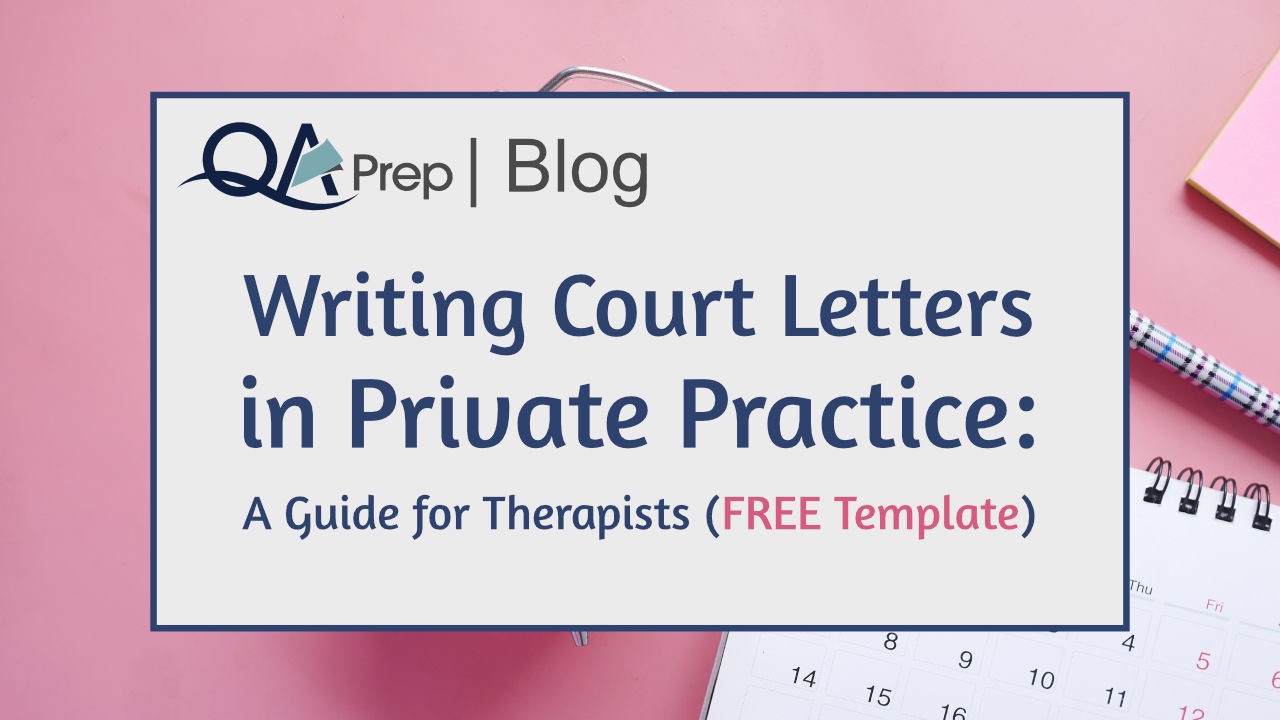Writing Court Letters in Private Practice: A Guide for Therapists
Feb 18, 2019
Need a professional therapist letter for court that stays within ethical boundaries? Keep reading and grab a FREE court letter template at the end of this post!
There are few things that stress out therapists as much as dealing with a subpoena or a request for records. Most mental health professionals prefer to avoid anything court-related at all costs.
However, many counselors unknowingly get involved with legal proceedings through one simple step:
Writing a treatment summary letter that is used in a court case.
While a treatment summary is often preferable to releasing psychotherapy records, it's important to remember that such a letter can significantly impact legal outcomes. We also need to make sure we review the potential consequences of writing letters with our clients.
You might be thinking, "What can be so harmful about writing a simple letter?"
Well, it is not so much the letter itself, but the potential for blurring lines of competence that can get therapists into trouble when their writing becomes involved in court cases.
A Common Scenario for Writing A Letter for Court as a Therapist

We'll call our imaginary therapist in this scenario "Mary Muggle, LMFT." Mary has been seeing children and adolescents in a private practice setting for about 10 years and has been licensed for about 12 years.
Mary begins seeing a 10-year-old boy we'll call Dudley. Dudley's parents are going through a divorce and over the last two months his grades have been dropping and his behavior includes getting into fights at school. His mother brings him to treatment and explains that Dudley's father travels frequently for work and is aware that Dudley will be receiving mental health treatment, but doesn't want to be involved.
Mary asks for custody paperwork and Dudley's mother brings in a form that isn't very clear but it appears that the parents have joint custody for now. Mary files this with her records and begins seeing Dudley for weekly therapy. She leaves a voicemail for Dudley's father to see if he can come in for an appointment but she never hears back.
During his sessions, Dudley often reports missing his father because he sees him very irregularly now that his parents are no longer living together. He reports visits with his father being sporadic and they include lots of take-out or junk food and very little discipline or structure. His father also does not seem to support mental health therapy and says things like, "Fighting isn't a problem. Not sticking up for yourself is a problem. Don't let them turn you into a pansy."
After about three months of weekly sessions Dudley has made some improvement in school and seems to enjoy his weekly sessions, but admits to Mary that he feels embarrassed to talk about them with his father.
It is around this time that Dudley's mother asks Mary to write a therapy summary letter for an upcoming court date related to child custody disputes.
She is worried that Dudley's father will ask for therapy to be discontinued. She also confides that she is concerned his father will request more time with Dudley now that he is done with the work project that required so much travel.
Mary writes a letter summarizing Dudley's reason for referral, his goals, therapeutic interventions, and progress to date, as well as Dudley's concerns about his father not supporting the therapy process. She highlights in the therapy letter that this can be detrimental to therapeutic rapport, Dudley's behavior at school, and she reports that Dudley's father has been uninvolved and may be a negative influence. She also recommends Dudley's mother remain the primary caregiver.
As the treating therapist, writing a letter about Dudley's treatment and mental health status is perfectly acceptable, but Mary makes two critical mistakes in this scenario:
-
She provides an opinion about Dudley's father without ever talking to Dudley's father.
-
She provides a recommendation related to custody without being appointed (or even trained) to do so.
These mistakes are critical errors because Mary is practicing outside her scope of practice and has a potentially harmful dual relationship.
 |
The Ethics of Dual Relationships and Scope of Practice |
As mental health professionals, we often see into the very vulnerable parts of individuals and families. We also form a connection with our clients. We like to use the term "therapeutic rapport" to sound more academic but it is often a simple, but transformative, human relationship we have with our clients.
This connection is important for counseling to provide a healing environment where clients can be vulnerable. However, this connection impairs our ability to be objective.
That is why, for example, it is usually unethical for me as a psychologist to do a psychological assessment with someone who is also a therapy client. Or to assess someone whom I already know well.
No matter how objective psychological tests are, my interpretation or evaluation report is very likely to be influenced by my prior knowledge of the person's abilities, history, etc.
Likewise, our relationship with our clients can impair our ability to objectively look at other situations, such as custody agreements. This applies when your client is the child, as well as when your client is one of the parents.
Child custody disputes are often very emotionally charged for all involved and this makes objectivity that much harder.
So it is generally considered unethical to provide an opinion about custody unless you are specifically trained in providing such an evaluation (which often have very specific legal guidelines and ramifications) and have no prior relationship with members of the family involved.
Are there exceptions to these ethical guidelines? Always!
For example, if you live in a rural area and there are very few providers, you might be the only person available to provide such an assessment, despite some type of prior affiliation with the family involved.
This is where we must consult our ethical guidelines, consult with colleagues who can offer guidance, and disclose all the potential factors that might be impacting our objectivity.
 |
Best Practices for Writing Court Letters |
So what do we do about writing letters for court?
Keep writing them!
(Or don't... more on that in a minute)
Yes, keep writing them but always keep in mind that letters can significantly impact legal outcomes and...
It is not your role as the treating therapist to make legal determinations for your clients. For example:
Should your client be excused from work because of the significant stress it is causing?
-
Your role is to assist the client through this process and potentially, provide a therapy letter explaining their current psychological condition and stressors.
Should your client receive social security disability benefits because of their diagnosis?
-
Your role is (typically) to report the symptoms, history of these symptoms, impact on the individual's mental health, and the prognosis based on your ongoing professional assessment.
Should your client who loves his children have custody of them because their mother (his ex-wife) is an alcoholic and currently in jail?
-
Your role is to simply report your client's progress in treatment, regardless of the circumstances.
Most counselors are well-meaning and genuinely think the recommendations they include in therapy letters will benefit their clients, and the others involved.
We became mental health professionals because we want to help people! And it often seems unfair when we can't help our clients, especially when our goal is to provide evidence of their progress.
However, you can help your clients when they are experiencing any of the above legal scenarios.
 |
Guidelines for Writing Effective Therapy Letters for Court |
Here are some general guidelines for writing letters that might be requested by attorneys, sent to an evaluator, or used to help judges make informed decisions about a client's role or benefits in some way:
-
Discuss with your client the limitations and potential ramifications of writing such a letter and that you cannot guarantee any type of outcome - positive or negative.
-
Stick to the facts. All of your statements should be backed by evidence (whether that's your own clinical assessment, reports by others, observation in therapy, etc.).
-
Report on what is observable and provide examples or quotes, if needed. Keep in mind that your client's statements about the situation or anything you have observed might be relevant here.
-
Keep your opinions about anyone or anything that is not your client out of the letter. For example, Mary could certainly write that Dudley's father has been unresponsive to her attempts to reach out and therefore uninvolved in treatment. Those are facts based on her experience, not an opinion.
-
Keep it simple. Stick with symptoms and/or reason for referral, the client's mental health status, therapeutic interventions, progress to date, and perhaps, treatment goals and prognosis for treatment.
-
Don't be afraid to say no or to charge for your time. Writing letters as a therapist is stressful and it does take time, but it's also not required, unless you have a subpoena or some other type of court order. You have every right to say no or to charge a reasonable fee for your time. Just make sure this is outlined in the policies in your informed consent form at intake!
Keep in mind these guidelines are generalized and you must always consult your own state laws and professional ethics!
Using these guidelines should help you stay ethical, provide guidelines for legal proceedings, create excellent care for your clients, and create a less stressful experience for you as the treating therapist.
Conclusion
Writing letters for court as a mental health professional requires careful consideration of ethical boundaries, objective reporting, and an understanding of how your professional document might be used. When done correctly, a therapy letter for court can provide valuable insights about a client's mental health status and progress in therapy, without overstepping into areas beyond your scope of practice.
 |
Get Your FREE Treatment Summary Template for Court |
Feeling nervous about writing your first treatment summary for court? We've got you covered!
Enter your info below and get instant access to a professional treatment summary template that:
-
Follows all ethical guidelines for reporting progress,
-
Contains sample language you can easily adapt, and
-
Helps you avoid common pitfalls that could compromise your professional standing.
Simply enter your email below, and you'll get instant access to the template. Plus, you'll receive weekly tips on mental health documentation, and more!

